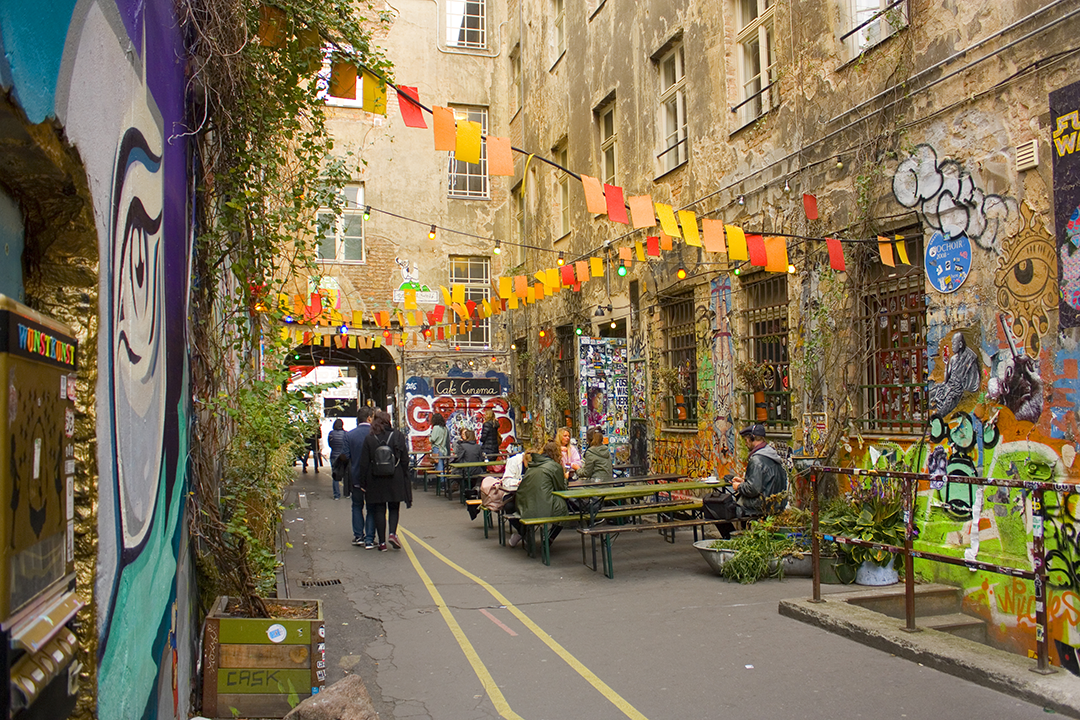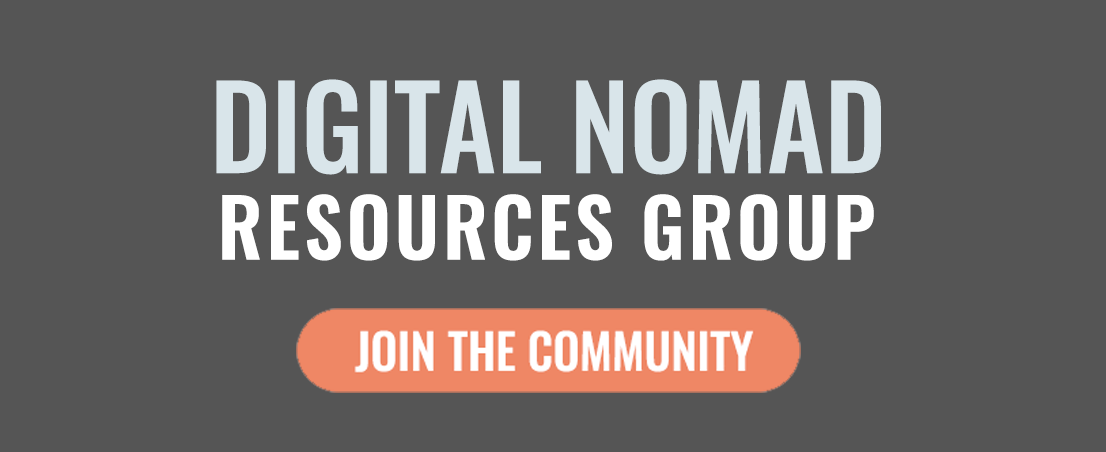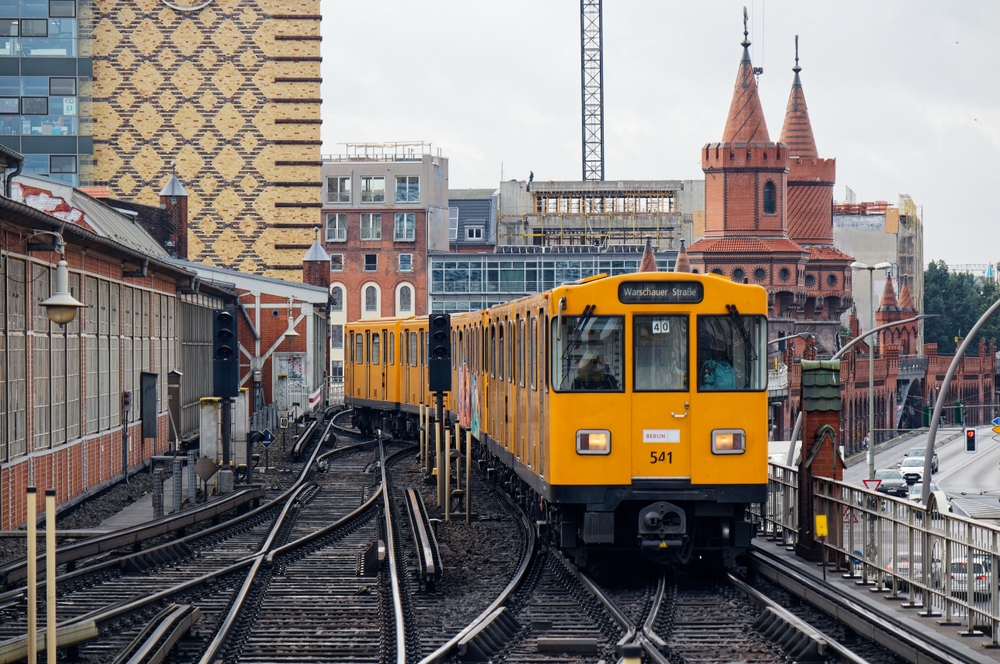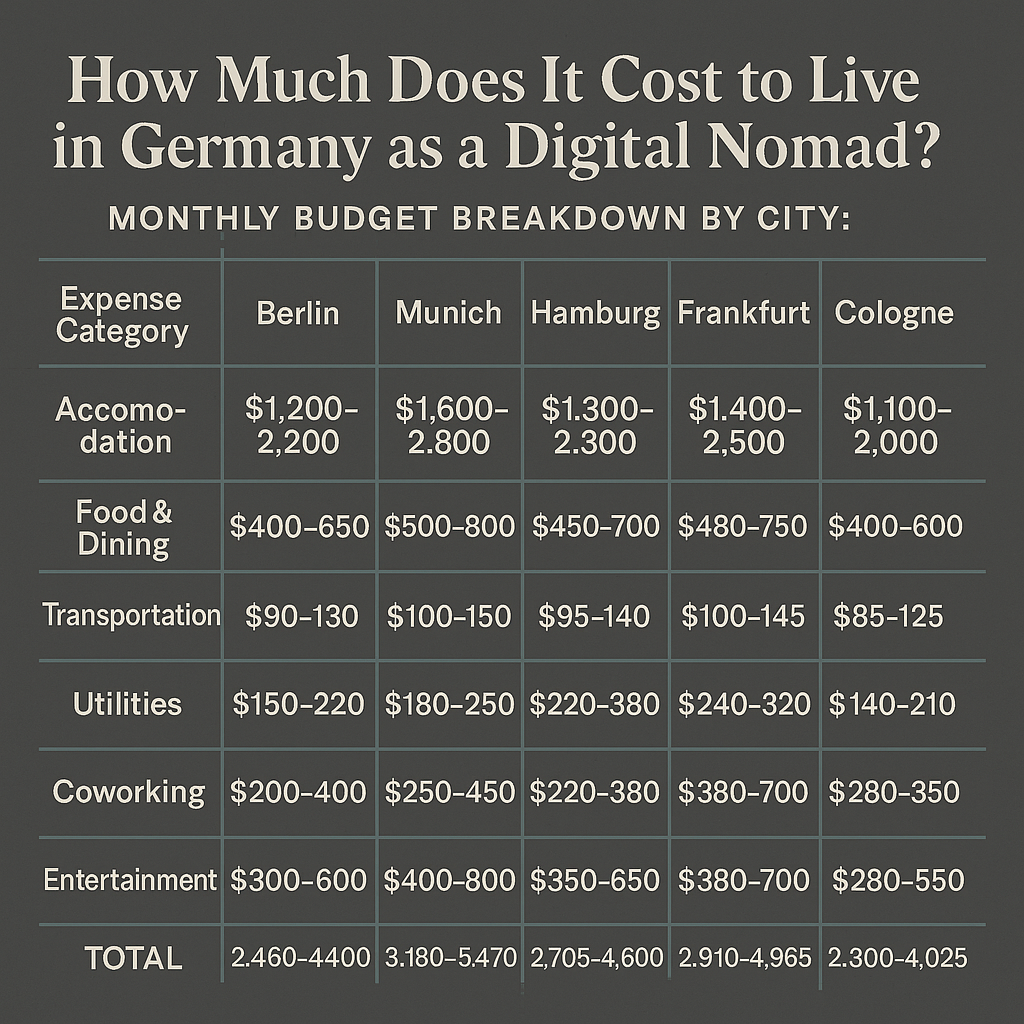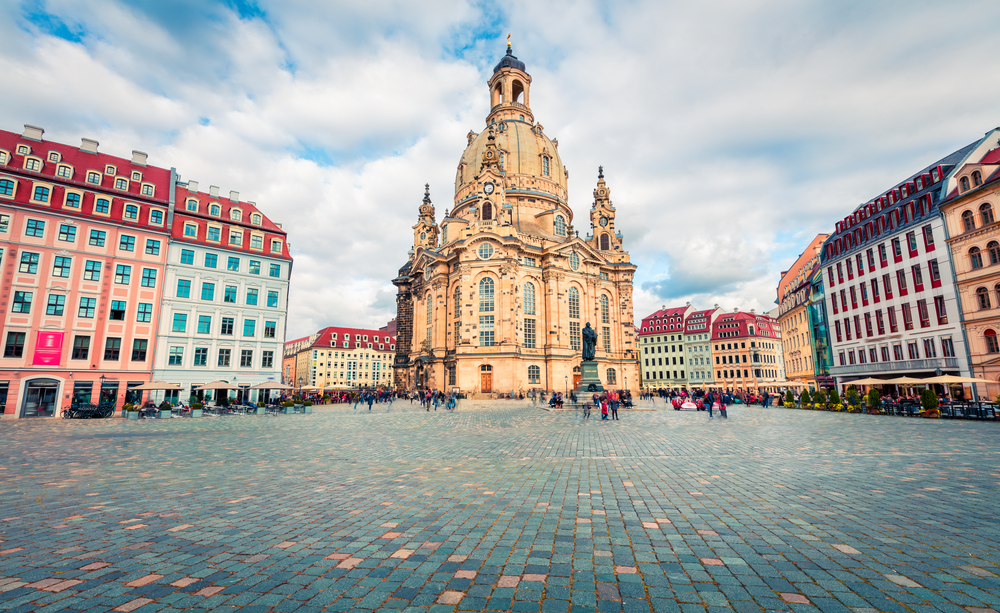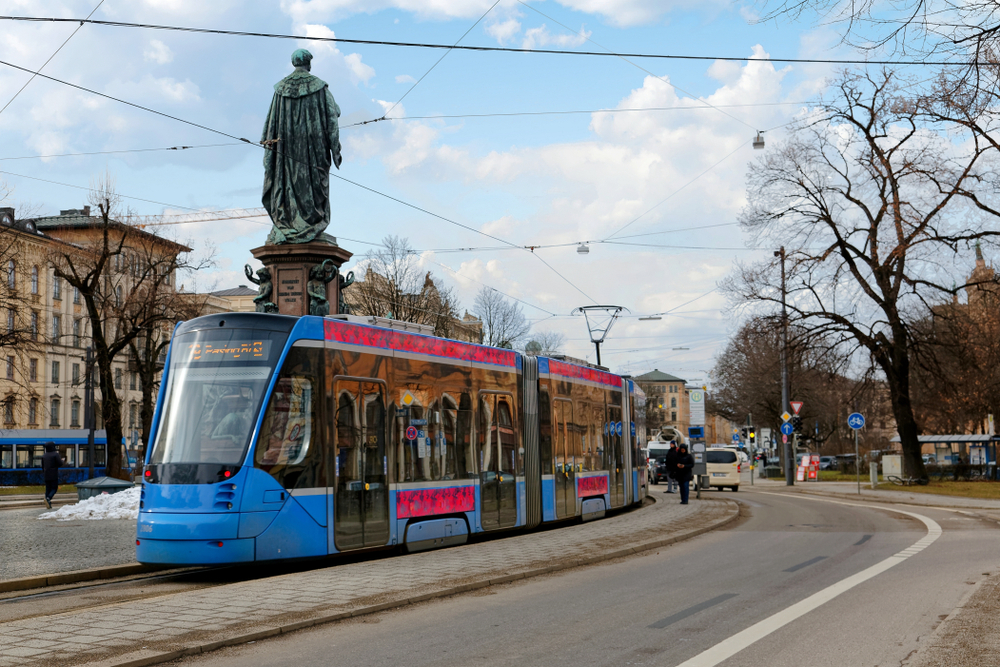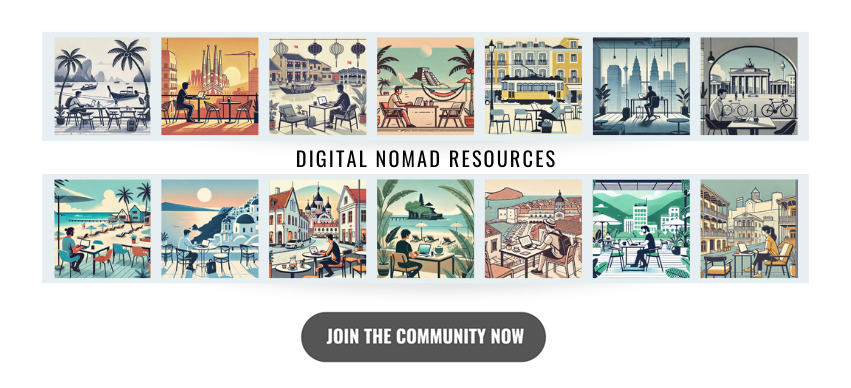Germany has emerged as one of Europe’s most attractive destinations for digital nomads, offering world-class infrastructure, a thriving startup ecosystem, excellent quality of life, and increasingly favorable visa options for remote workers. From Berlin’s dynamic tech scene to Munich’s traditional charm and Hamburg’s maritime culture, Germany provides diverse environments for location-independent professionals seeking European opportunities in the continent’s economic powerhouse.
Quick Answer: Germany offers digital nomads several visa pathways including the Freelancer Visa (up to 3 years) and upcoming Digital Nomad Visa, monthly living costs starting around $2,200, world-class internet infrastructure, and access to Europe’s largest economy. The country combines excellent business opportunities with high quality of life, though costs are higher than Southern European alternatives.
Table of Contents
Germany’s Visa Options for Digital Nomads
Why Choose Germany for Remote Work
Top Cities for Digital Nomads
Living Costs and Budgeting
Internet and Infrastructure
Practical Considerations
Legal and Tax Information
Healthcare and Insurance
Working Culture and Business
Challenges to Consider
Frequently Asked Questions
Conclusion
Germany’s Visa Options for Digital Nomads
Current Visa Pathways for Remote Workers
While Germany doesn’t yet have a dedicated “Digital Nomad Visa,” several options exist for remote workers, with new developments expected in 2025.
Freelancer Visa (Freiberufler)
Germany’s Primary Option for Digital Nomads
The Freelancer Visa is currently the most viable pathway for digital nomads working in Germany.
Key Details of Germany’s Freelancer Visa:
- Duration: Up to 3 years initially, renewable
- Eligibility: Freelancers, consultants, and independent professionals
- Income Requirement: Proof of financial sustainability (typically $3,000-4,000/month)
- Processing Time: 4-12 weeks
- Application Fee: Approximately $110
- Application Process: German embassy/consulate in home country, then local Ausländerbehörde
- Requirements: Professional qualifications, business plan, proof of clients/contracts
- Benefits: Legal work authorization, access to healthcare, path to permanent residency
- Eligible Professions: IT, design, consulting, writing, marketing, architecture, and more
Opportunity Card (Chancenkarte) – New in 2024
Points-Based System for Skilled Workers
Germany’s new Opportunity Card offers another pathway for qualified digital nomads.
Opportunity Card Details:
- Duration: 1 year initially
- System: Points-based on qualifications, language skills, age, and experience
- Points Required: Minimum 6 points from various categories
- Benefits: Job seeking period, limited work authorization
- Language: German language skills highly beneficial
- Target: Skilled professionals seeking German opportunities
Upcoming Digital Nomad Visa (Expected 2025)
Germany’s Dedicated Remote Worker Visa
Germany has announced plans for a specific Digital Nomad Visa, expected to launch in 2025.
Expected Features:
- Duration: 1-2 years anticipated
- Income Requirement: Estimated $3,500-4,500/month
- Work Restrictions: Remote work for non-German companies
- Application Process: Streamlined online application expected
- Benefits: Legal clarity for remote workers
Alternative Options
Tourist Visa (Schengen)
- Duration: 90 days within 180-day period
- Limitations: No work authorization, limited access to services
Student Visa
- Duration: Length of study program
- Requirements: Enrollment in German educational institution
- Benefits: Part-time work permitted
EU Blue Card
- Duration: Up to 4 years
- Requirements: University degree, job offer with minimum salary
- Target: Highly skilled professionals with German employment
Why Choose Germany for Remote Work
What Makes Germany Special for Remote Workers?
Germany offers unique advantages that make it particularly attractive for serious digital nomads and remote professionals.
Economic and Business Advantages
- Europe’s largest economy with extensive business opportunities
- Thriving startup ecosystem, particularly in Berlin and Munich
- Strong tech sector with international companies
- Central location for European business travel
- Excellent networking opportunities and professional events
Infrastructure and Connectivity
- World-class internet infrastructure (average 100+ Mbps nationwide)
- Exceptional public transportation systems
- Modern airports with connections worldwide
- Reliable utilities and services
- Advanced digital government services
Quality of Life Benefits
- High safety standards and low crime rates
- Excellent healthcare system
- Strong environmental protections
- Rich cultural scene and historical heritage
- Work-life balance culture
Geographic and Cultural Advantages
- Central European location for easy travel
- Diverse landscapes from Alps to North Sea
- Four distinct seasons with varied activities
- Strong English proficiency in business environments
- International and multicultural cities
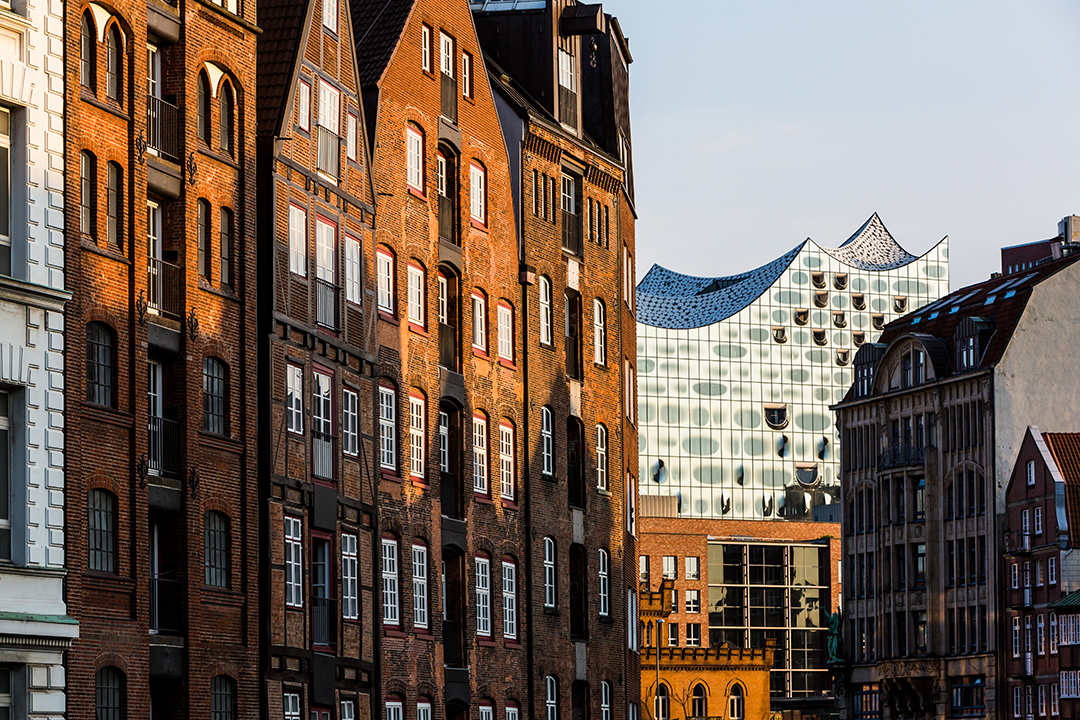
Top Cities for Digital Nomads
Berlin: The Startup Capital
Why Choose Berlin for Remote Work?
Germany’s capital has transformed into one of Europe’s most dynamic tech hubs, offering a perfect blend of history, culture, and innovation.
Digital Infrastructure and Scene
- Extensive fiber internet coverage (100-1000 Mbps widely available)
- 100+ coworking spaces including Rocket Internet Campus, WeWork, and GTEC
- Day passes: $25-40
- Monthly memberships: $200-400
- Largest startup ecosystem in Germany
Living Costs in Berlin
- Budget lifestyle: $2,200-2,800/month
- Comfortable lifestyle: $3,200-4,500/month
- Luxury lifestyle: $5,500+/month
Best Neighborhoods for Digital Nomads
- Mitte: Central location with historic significance
- Kreuzberg: Alternative culture and vibrant nightlife
- Prenzlauer Berg: Family-friendly with excellent cafes
- Friedrichshain: Young, dynamic area with good transport
- Charlottenburg: More upscale with business district proximity
Pros and Cons of Berlin ✅ Pros:
- Extensive startup and tech networking opportunities
- Rich cultural scene with museums, galleries, and events
- Excellent public transportation (BVG system)
- International atmosphere with diverse population
- Relatively affordable compared to Munich or Hamburg
❌ Cons:
- Bureaucratic processes can be complex
- German language helpful for many services
- Winters can be long and gray
- Housing market competitive
Munich: The Economic Powerhouse
What Makes Munich Special for Digital Nomads?
Bavaria’s capital combines traditional German culture with modern business opportunities, serving as headquarters for many international corporations.
Business and Digital Scene
- Major corporate headquarters (BMW, Siemens, Allianz)
- Growing tech sector with Google, Microsoft offices
- High-speed internet infrastructure throughout city
- Premium coworking spaces including Design Offices and Mindspace
- Strong consulting and professional services sector
Munich Living Costs
- Budget lifestyle: $2,800-3,500/month
- Comfortable lifestyle: $4,000-5,500/month
- Luxury lifestyle: $7,000+/month
Best Areas for Remote Workers
- Altstadt: Historic city center with business proximity
- Schwabing: University area with cultural attractions
- Maxvorstadt: Museums and academic institutions
- Glockenbachviertel: Trendy area with good restaurants
- Lehel: Upscale residential with excellent transport
Why Choose Munich
- Proximity to Alps for weekend activities
- Strong economy with business opportunities
- Excellent quality of life and safety
- Traditional German culture and Oktoberfest
- High earning potential for freelancers and consultants
Hamburg: The Maritime Hub
Is Hamburg Good for Digital Nomads?
Germany’s second-largest city offers a unique blend of maritime culture, media industry presence, and growing tech sector.
Digital Infrastructure in Hamburg
- Comprehensive fiber network coverage
- Growing coworking scene with spaces like betahausand GTEC
- Strong media and advertising industry
- Port logistics and international trade connections
Hamburg Living Costs
- Budget lifestyle: $2,400-3,000/month
- Comfortable lifestyle: $3,500-4,800/month
- Luxury lifestyle: $6,000+/month
Benefits of Hamburg for Remote Workers
- Less tourist-heavy than Berlin or Munich
- Strong maritime and logistics industry connections
- Excellent cultural scene with theaters and music venues
- More affordable than Munich
- Good work-life balance culture
Frankfurt: The Financial Center
Why Consider Frankfurt for Remote Work?
As Europe’s financial capital, Frankfurt offers unparalleled business opportunities despite its smaller size.
Frankfurt Advantages
- Major international airport hub
- European Central Bank and financial institutions
- High concentration of international businesses
- Excellent public transportation
- Strong English-language business environment
Frankfurt Living Costs
- Budget lifestyle: $2,600-3,200/month
- Comfortable lifestyle: $3,800-5,200/month
- Luxury lifestyle: $6,500+/month
Cologne: The Media and Culture Hub
What Makes Cologne Special?
One of Germany’s oldest cities combines rich history with a thriving media and creative industry.
Cologne Benefits
- Major media and television industry presence
- Art galleries and cultural institutions
- University city with young demographic
- More affordable than Frankfurt or Munich
- Central location in North Rhine-Westphalia
Cologne Living Costs
- Budget lifestyle: $2,200-2,700/month
- Comfortable lifestyle: $3,100-4,200/month
- Luxury lifestyle: $5,500+/month
Living Costs and Budgeting
How Much Does It Cost to Live in Germany as a Digital Nomad?
Monthly Budget Breakdown by City:
|
Expense Category |
Berlin |
Munich |
Hamburg |
Frankfurt |
Cologne |
|
Accommodation |
$1,200-2,200 |
$1,600-2,800 |
$1,300-2,300 |
$1,400-2,500 |
$1,100-2,000 |
|
Food & Dining |
$400-650 |
$500-800 |
$450-700 |
$480-750 |
$400-600 |
|
Transportation |
$90-130 |
$100-150 |
$95-140 |
$100-145 |
$85-125 |
|
Utilities |
$150-220 |
$180-250 |
$160-230 |
$170-240 |
$140-210 |
|
Coworking |
$200-400 |
$250-450 |
$220-380 |
$240-420 |
$180-350 |
|
Entertainment |
$300-600 |
$400-800 |
$350-650 |
$380-700 |
$280-550 |
|
Healthcare |
$120-200 |
$150-220 |
$130-200 |
$140-210 |
$115-190 |
|
TOTAL |
$2,460-4,400 |
$3,180-5,470 |
$2,705-4,600 |
$2,910-4,965 |
$2,300-4,025 |
All amounts in USD.
What Affects Living Costs in Germany?
Regional Variations
- Most Expensive: Munich, Frankfurt, Stuttgart, Hamburg
- Moderate Costs: Berlin, Cologne, Düsseldorf
- More Affordable: Leipzig, Dresden, smaller cities
Accommodation Factors
- City center vs. outer districts (30-50% price difference)
- Furnished (möbliert) vs. unfurnished rentals
- WG (shared apartment) vs. private apartment
- Anmeldung (registration) requirements affect rental options
Internet and Infrastructure
How Good is Germany’s Internet for Remote Work?
Germany offers excellent internet infrastructure, though speeds can vary by region and provider.
Internet Speed by Region
- Major Cities: Average 150-300 Mbps (fiber widely available)
- Smaller Cities: Average 50-150 Mbps
- Rural Areas: Average 25-100 Mbps (improving with fiber expansion)
Major Internet Providers
- Deutsche Telekom: Largest provider with extensive fiber network
- Vodafone: Strong cable and fiber coverage
- O2: Competitive in urban areas
- 1&1: Good value for fiber connections
Mobile Internet Options
- Extensive 4G/5G coverage in urban areas
- Three major networks: Telekom, Vodafone, O2
- Data plans typically $30-60/month for substantial data
- EU roaming included in most plans
Business Internet Solutions
- Dedicated business lines available
- Guaranteed speeds and uptime
- Technical support in English
- Backup connection options
Practical Considerations
Bureaucracy and Registration (Anmeldung)
Mandatory Registration Requirements
- Anmeldung: Must register address within 14 days of arrival
- Documents needed: Passport, rental contract, completed form
- Process: Visit local Bürgeramt (citizen’s office)
- Importance: Required for banking, insurance, visa extensions
Other Important Registrations
- Tax number (Steuernummer): Required for freelance work
- Health insurance: Mandatory for all residents
- Bank account: Often requires Anmeldung confirmation
Transportation in Germany
Public Transportation Excellence
- Deutsche Bahn: Extensive train network connecting cities
- Local Transport: Excellent bus, tram, and subway systems
- Deutschland-Ticket: €49/month for unlimited public transport nationwide
- Integration: Seamless connections between different transport modes
Alternative Transportation
- Car sharing: DriveNow, ShareNow widely available
- Bike sharing: nextbike, Call a Bike in major cities
- E-scooters: Tier, Lime available in urban areas
- Taxis and rideshares: Uber limited; traditional taxis prevalent
Banking and Finance
Opening a German Bank Account
- Required documents: Anmeldung, passport, income proof
- Major banks: Deutsche Bank, Commerzbank, Sparkasse
- Online banks: N26, DKB, Comdirect (often easier for expats)
- Timeline: 1-2 weeks with proper documentation
Banking Features
- EC-Karte: Debit cards widely accepted
- Cash culture: Many establishments still prefer cash
- Online banking: Advanced systems with strong security
- International transfers: SEPA transfers within EU
Language Considerations
German Language Importance
- Business: High English proficiency in tech/international companies
- Daily life: German helpful for government services, healthcare
- Social integration: German opens more social and cultural opportunities
- Regional differences: Some regional dialects and customs
Learning German
- Goethe Institute: Official German language courses
- VHS (Volkshochschule): Community colleges with affordable classes
- Integration courses: Government-funded German classes
- Language exchange: HelloTalk, Tandem apps popular
Legal and Tax Information
German Tax System for Digital Nomads
Tax Residency Rules
- 183-day rule: Spending 183+ days makes you German tax resident
- Unlimited liability: German residents taxed on worldwide income
- Limited liability: Non-residents taxed only on German-source income
Freelancer Tax Treatment
- Income tax: Progressive rates from 14% to 45%
- Church tax: Optional 8-9% of income tax
- Solidarity surcharge: 5.5% of income tax (being phased out)
- VAT registration: Required if annual revenue exceeds €22,000
Tax Benefits and Deductions
- Business expenses: Office equipment, travel, training deductible
- Home office: Portion of rent and utilities deductible
- Professional development: Courses and conferences deductible
- Double taxation treaties: Prevent double taxation for many countries
Freelancer Regulations
Künstlersozialkasse (KSK)
- Artist social insurance: Reduced social security contributions for creative professionals
- Eligibility: Writers, designers, artists, musicians, etc.
- Benefits: Health and pension insurance at reduced rates
Professional Liability Insurance
- Berufshaftpflicht: Professional liability insurance
- Requirement: Mandatory for some professions
- Cost: Typically $200-500/year depending on field
Healthcare and Insurance
German Healthcare System
Mandatory Health Insurance
- Public insurance (Gesetzlich): Available to residents with income below €64,350/year
- Private insurance (Privat): Required for higher earners and self-employed
- Cost: 14.6% of income (split between employer/employee), freelancers pay full amount
Healthcare Quality
- World-class system: Ranked among top 10 globally
- Comprehensive coverage: Preventive care, treatments, prescriptions
- English-speaking doctors: Available in major cities
- Specialist access: May require referrals but generally accessible
Popular Insurance Providers
- Public: AOK, Barmer, TK (Techniker Krankenkasse)
- Private: Allianz Care, BUPA, Cigna Global
- For nomads: SafetyWing, World Nomads during transition period
Mental Health and Wellness
Mental Health Support
- Psychotherapy: Covered by insurance with referral
- English-speaking therapists: Available in major cities
- Crisis support: Telefonseelsorge (0800 111 0 111) provides 24/7 support
- Workplace wellness: Strong focus on work-life balance
Working Culture and Business
German Business Culture
Professional Environment
- Punctuality: Extremely important in all contexts
- Direct communication: Straightforward, honest feedback expected
- Hierarchy: Respect for titles and positions
- Work-life balance: Strong boundaries between work and personal time
- Quality focus: Thoroughness and precision highly valued
Networking and Professional Development
- XING: German professional networking platform
- Industry associations: Strong professional organizations
- Conferences and events: Numerous tech and business conferences
- Mentorship culture: Experienced professionals willing to help newcomers
Coworking and Office Culture
Coworking Space Features
- High-speed internet: Guaranteed reliable connections
- Professional atmosphere: Focus on productivity and networking
- Event programming: Regular workshops and networking events
- International community: Mix of German and international professionals
Popular Coworking Chains
- WeWork: Multiple locations in major cities
- Mindspace: Premium coworking with design focus
- GTEC: Germany-focused coworking network
- Betahaus: Creative community-focused spaces
Challenges to Consider
Potential Drawbacks of Living in Germany
Bureaucratic Complexity
- Paperwork intensive: Many processes require multiple forms and appointments
- Language barriers: Government services primarily in German
- Anmeldung requirements: Complex registration process
- Appointment systems: Many services require advance booking
Cost of Living
- High taxes: Combined income and social security taxes can exceed 40%
- Expensive housing: Rental markets competitive in major cities
- High utility costs: Electricity particularly expensive
- Service costs: Professional services (lawyers, accountants) costly
Cultural Adjustments
- Direct communication style: Can seem blunt to some cultures
- Rule-oriented society: Many regulations and expectations
- Cash preference: Many businesses don’t accept cards
- Sunday closures: Most shops closed on Sundays
Climate Considerations
- Limited sunshine: Especially during winter months
- Seasonal depression: Vitamin D deficiency common
- Weather variability: Unpredictable weather patterns
- Heating costs: High winter utility bills
Frequently Asked Questions
Can I work remotely for non-German companies on a German visa? Yes, the Freelancer Visa allows work for international clients. However, you must register as a freelancer (Freiberufler) and handle German tax obligations.
How long does it take to get a German Freelancer Visa? Processing typically takes 4-12 weeks from application submission, depending on the German consulate and completeness of documentation.
Do I need to speak German to work as a digital nomad in Germany? While not always required for international companies, German language skills significantly improve daily life, bureaucratic processes, and local networking opportunities.
What’s the difference between Freiberufler and Gewerbe in Germany? Freiberufler (freelancer) status applies to creative and intellectual professions with simplified registration. Gewerbe (trade) requires business registration and different tax treatment.
Can I get permanent residency in Germany as a digital nomad? Yes, after 5 years of legal residence with appropriate visas, you can apply for permanent residency (Niederlassungserlaubnis).
Is health insurance mandatory for digital nomads in Germany? Yes, all residents must have health insurance. This can be German public/private insurance or international coverage that meets German requirements.
Conclusion
Germany represents an exceptional opportunity for digital nomads seeking to establish themselves in Europe’s economic powerhouse while enjoying world-class infrastructure, business opportunities, and quality of life. While the visa pathways require more preparation than some alternatives, the potential rewards – both professional and personal – make Germany an increasingly attractive destination for serious remote workers.
Whether you’re drawn to Berlin’s dynamic startup ecosystem, Munich’s corporate opportunities, Hamburg’s maritime culture, or Frankfurt’s financial sector connections, Germany offers diverse environments to suit different professional goals and lifestyle preferences. The country’s central European location, excellent transportation networks, and strong English-language business environment make it an ideal base for both remote work and European business development.
The upcoming Digital Nomad Visa will further strengthen Germany’s position as a premier destination for location-independent professionals. Combined with the existing Freelancer Visa pathway and the new Opportunity Card system, Germany is clearly committed to attracting international talent and expertise.
For digital nomads willing to navigate German bureaucracy and invest in language learning, Germany offers unparalleled access to Europe’s largest economy, exceptional professional development opportunities, and a quality of life that consistently ranks among the world’s best. As more international companies establish German operations and the digital economy continues to expand, the opportunities for remote workers in Germany will only continue to grow.
The investment in establishing yourself in Germany – whether for a year or permanently – pays dividends through access to European markets, high-quality healthcare and education systems, and the security that comes with operating within one of the world’s most stable and prosperous economies.
Last updated: May 2025. Visa requirements and costs may change. Always consult official German government sources for the most current information.
Ready to make your digital nomad dreams a reality? Download our comprehensive Digital Nomad Visa Guide for detailed requirements and official resources for each destination.
Connect with fellow location-independent professionals by joining our exclusive Sojrn Digital Nomad Community for ongoing support, insider tips, and updates to enhance your borderless lifestyle.
